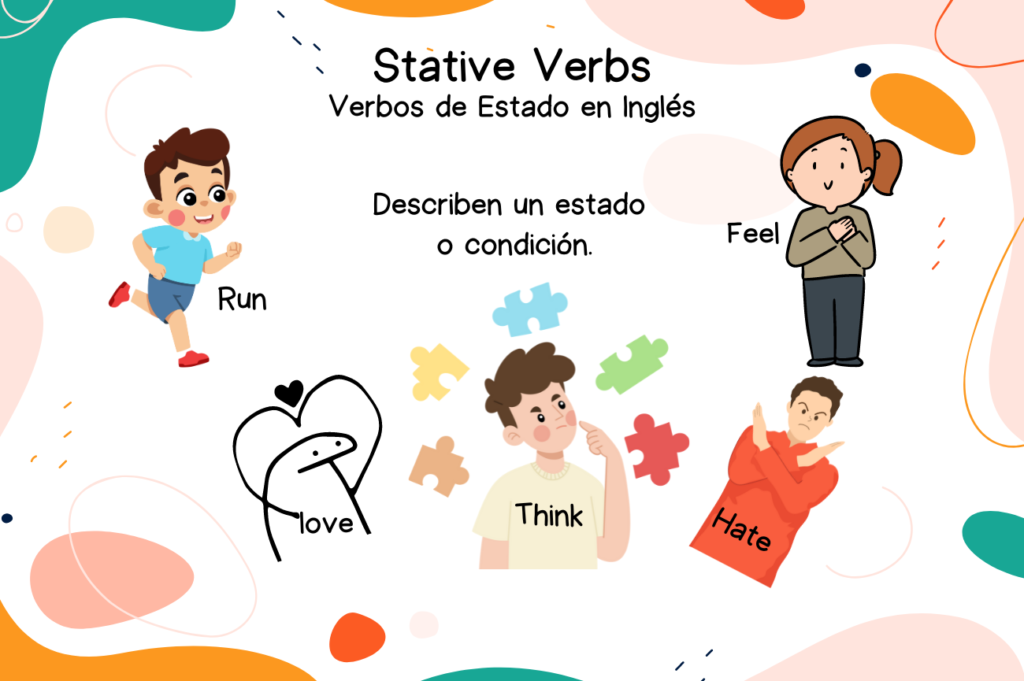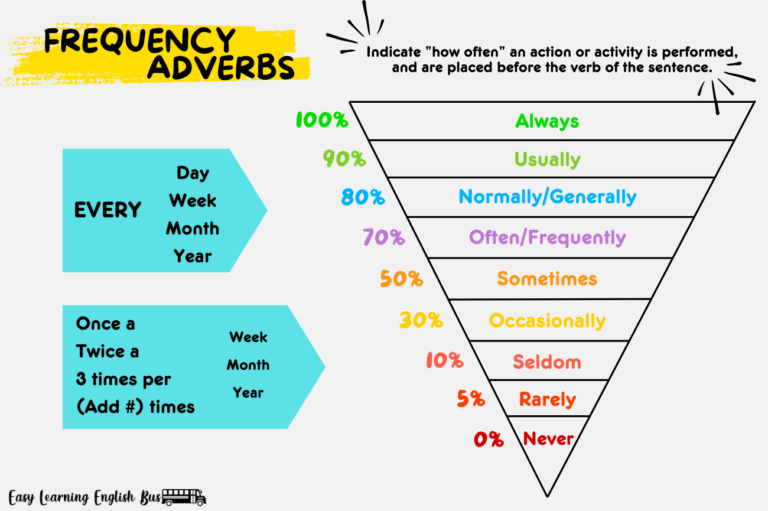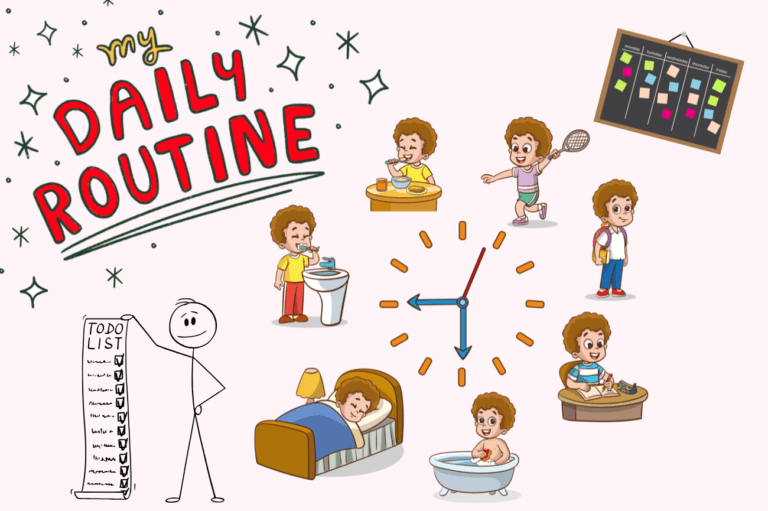
Table of Contents
What are the Stative Verbs?
¿Qué son los Verbos de Estado en Inglés?
Los stative verbs, o verbos de estado en inglés, son palabras que usamos para hablar de cómo son o están las cosas. Estos describen un estado o condición que no implica acción o movimiento, como correr o saltar, sino que nos indican estados o situaciones. Los stative verbs se usan para expresar estados emocionales, mentales, físicos, de percepción y de relación. Pero si aún te preguntas: ¿por qué son diferentes de otros verbos? Te lo explico:
Stative verbs vs action verbs:
- Stative verbs: The kitten is very loving.
- El gatito es muy cariñoso.
- En este ejemplo, el verbo “is” nos dice algo que el gatito es muy cariñoso, es decir, describe cómo es el gatito
- El gatito es muy cariñoso.
- Dynamic/action Verbs: The kitty runs fast.
- El gatito corre rápido.
- En este ejemplo, el verbo “runs” es una acción que puedes ver.
- El gatito corre rápido.
Nota:
Los stative verbs no se usan en tiempos continuos (present continuous, past continuous, future continuous) porque estos tiempos se refieren a acciones en progreso en un momento específico. En cambio, se usan en tiempos simples (present simple, past simple, future simple) y en algunas estructuras especiales, como en las formas de infinitivo y gerundio.
How to classify the Stative Verbs?
Los stative verbs se pueden clasificar según estados mentales, emociones, posesión, sentido, o características, y se dividen en 5 formas:
1. Verbos de Percepción y Sentidos:
Describen percepciones sensoriales y estados de los sentidos.
| Verbs | Verbos | Examples |
|---|---|---|
| Feel | Sentir (en términos de textura o temperatura) | The cushion feels comfortable. |
| Taste | Saborear (de gusto) | This burger tastes delicious |
| Smell | Oler | The flowers smell lovely. |
| Hear | Oir | Can you hear the music? |
| See | Ver | I see a bird in the tree. |
| Imagine | Imaginar | I imagine a dragon. |
2. Verbos de Emoción y Gustos:
Expresan emociones y estados emocionales, también manifiestan preferencias.
| Verbs | Verbos | Examples |
|---|---|---|
| Love | Amar | I love chocolate. |
| Like | Gustar | She likes her new job. |
| Hate | Odiar | He hates waiting. |
| Prefer | Preferir | I prefer tea to coffee. |
| Dislike | No gustar, disgustar | They dislike noisy places. |
3. Verbos de Pensamiento y Opinión:
Estos verbos están relacionados con procesos mentales, también indican ideas y opiniones.
| Verbs | Verbos | Examples |
|---|---|---|
| Know | Saber/conocer | I know the answer. |
| Believe | Creer | She believes in ghosts. |
| Understand | Entender | Do you understand the question? |
| Think | Pensar (opinar) | I think he is right. |
| Mean | Significar | What does this word mean? |
| Depend | Depender | Our success depends on teamwork. |
| Disagree | No estar de acuerdo, desacuerdo | They often disagree about our rules. |
| Agree | Estar de acuerdo, deacuerdo | I agree with your decision. |
| Remember | Recordar | I remember our trip to the mountains. |
| Suppose | Suponer | I suppose we should start the meeting now. |
| Doubt | Dudar | I doubt that it will rain today. |
| Mind | Preocupar | I don’t mind very much what happens |
4. Verbos de Atributos y Medidas:
Describen estados de medida, cantidad, costos, capacidad y otros tipos de características.
| Verbs | Verbos | Examples |
|---|---|---|
| Contain | Contener | The box contains old photos. |
| Consist of | Consistir en | The team consists of five players. |
| Measure | Medir | We need to measure the length of the table before buying a new one. |
| Weigh | Pesar | The chef needs to weigh the ingredients carefully for the recipe. |
5. Verbos de Posesión:
Indican posesión o relaciones entre cosas, y señalan propiedades materiales.
| Verbs | Verbos | Examples |
|---|---|---|
| Have | Tener | She has two cats. |
| Own | Poseer | They own a house. |
| Possess | Poseer | He possesses great talent. |
| Belong | Pertenecer | This book belongs to me. |
6. Verbos de Necesidad:
Estos verbos reflejan exigencias o requisitos.
| Verbs | Verbos | Examples |
|---|---|---|
| Deserve | Merecer | She worked very hard and deserves the promotion. |
| Need | Necesitar | We need more information before making a decision. |
| Want | Querer | I want to travel to Japan next year. |
| Wish | Desear | I wish I could speak multiple languages fluently. |
20 Stative verbs examples más comunes en Inglés
| Stative Verbs | Verbos de Estado |
|---|---|
| Be | Ser, estar |
| Like | Gustar |
| Love | Amar |
| Hate | Odiar |
| Want | Querer |
| Need | Necesitar |
| Know | Saber, conocer |
| Understand | Entender |
| Believe | Creer |
| Remember | Recordar |
| Forget | Olvidar |
| Seem | Parecer |
| Belong | Pertenecer |
| Contain | Contener |
| Consist | Consistir |
| Depend | Depender |
| Matter | Importar |
| Appear | Aparecer |
| Prefer | Preferir |
| Own | Poseer, tener |


